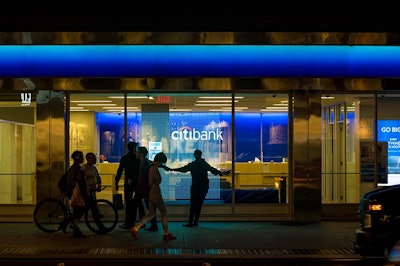
Global banking institution Citigroup issued a cease-and-desist letter to a newly licensed California dispensary in early April, arguing that the dispensary’s name and logo infringed upon the bank’s reputable name and diluted its famous trademark.

“Unless you are as high as a kite, you know that Citi isn’t affiliated with this business in any way, and we have requested that they stop using Citi’s name and logo,” Danielle Romero-Apsilos, a spokeswoman for Citigroup, told the New York Post. (The Post first tipped off Citigroup by asking for a comment last month.)
Corporate affiliation is an important crux in this story: There’s no reasonable assumption that a consumer would confuse Citidank for a banking institution. For years in the U.S., traditional trademark infringement required a likelihood of such confusion. That remains the bedrock of trademark infringement disputes.
In 1995, though, regulations loosened. The Federal Trademark Dilution Act stated that entities holding “famous” trademarks could rest an infringement claim on the “likely” dilution of their mark. According to the law, dilution can occur when another entity “tarnishes” or “blurs” the original trademark’s distinctiveness—if that original mark is sufficiently reputable. Citigroup, being an American banking titan, satisfies that requirement, according to Ed Weisz, an intellectual property attorney at Cozen O’Connor.
“There’s no likelihood of confusion, because the goods are different, the services are different,” Weisz says. “No consumer in their right mind would be confused. … But still, because of tarnishment or because [the new brand may affect] the reputation of the famous mark, those are still causes of action now under the trademark law.”
As to whether the reputation of the Citigroup trademark has a standing here?
“Good luck trying to prove it’s not famous,” Weisz says.
There’s a certain Fair Use defense when a trademark is being used as a one-time parody. However, since Citidank is an ongoing commercial enterprise, that is an unlikely claim in this case.
The primary remedy here would be a legal injunction, in which a judge would demand that Citidank back off the name and logo—much like GG Strains was instructed to do last year. In that case, the dispute between the manufacturers of Gorilla Glue and GG Strains (which produced a strain of cannabis called Gorilla Glue) brought both companies into a civil lawsuit; Gorilla Glue won, and the strain was renamed GG4.
The current matter at hand may come to court if Citidank owners do not affirmatively respond to Citigroup’s letter.
Citidank did not return Cannabis Dispensary’s request for comment.
The dispute offers a chance to examine how trademark law is applied to cannabis businesses. While the Federal Trademark Dilution Act would be in play here regardless of what industry took advantage of Citigroup’s branding, other trademark disputes in the cannabis world won’t be as simple.
“I think that the cannabis industry right now has a hurdle of no federal protection for their brand, and that’s a significant hurdle. You’re really stuck between a rock and a hard place, especially now that there are multiple states [that have legalized cannabis],” Weisz says.
Cannabis businesses in Colorado, for instance, are unable to protect their name or their logo from being copied by a company in Oregon, thus affecting sales and reputation. Expansion becomes almost impossible for a company that finds itself in that interstate quandary.
“It’s a big hassle,” Weisz says. “Throw in the fact that trademarks are significant assets of a business. … You’re a cannabis proprietor: How do you develop goodwill in your brand so you can get investors or [so] you can cash out and sell our business?”
Cannabis companies using different trademarks in different states are at a disadvantage when it comes to building corporate value over the long-term, as opposed to how corporate branding works in just about any other U.S. industry.
“Trademarks provide goodwill. That’s the point of trademarks,” Weisz says. “When you buy it, you know what you’re getting.”
Top photo by Dan DeLuca/Flickr Creative Commons


























